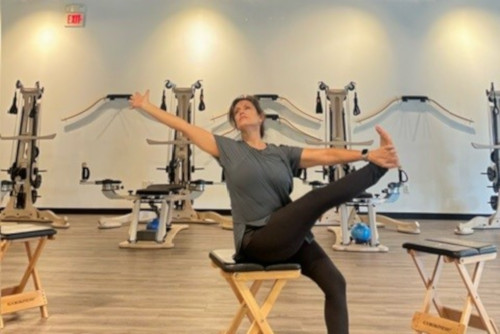Pelvic health is often overlooked in the athletic world, especially for young female athletes. At ELEMENTAL, we believe it’s crucial to raise awareness of this important topic. Dr. Amy Robinson, a pelvic health specialist with over 26 years of experience, explains that symptoms like tailbone pain, urinary leakage, and pelvic discomfort in young athletes can often be dismissed as orthopedic issues, but they may signal deeper problems with the pelvic floor.
“There’s a tendency to brush off these symptoms in young athletes,” says Dr. Robinson, who was once a competitive swimmer, cheerleader, and track athlete herself. “We must look at the child holistically to ensure nothing is missed.” Dr. Robinson explains that conditions like tailbone pain, hip pain, and even urinary issues can arise from pelvic floor dysfunction caused by falls, repetitive movements, and inefficient breathing, all common in dynamic sports like gymnastics, volleyball, and cheer.
By understanding the signs of pelvic floor dysfunction, parents can help their daughters avoid long-term health consequences, including infertility. Here are five key symptoms to watch out for:
1. Irregular Bowel Movements
Straining or infrequent bowel movements in young athletes can result from pelvic floor muscle dysfunction, often caused by inefficient breathing and over-tight muscles.
2. Limiting Food Intake
A balanced diet is critical to hormone regulation. Teens who restrict food intake are at risk of developing hormonal imbalances that can affect their overall health, including pelvic health.
3. Back, Hip, or Tailbone Pain
These common complaints in cheer, dance, gymnastics, and other sports often indicate deeper issues with pelvic floor muscles, which can cause pain and discomfort, along with urinary or bowel problems.
4. Urinary Leaking
Urinary leaking affects around 50% of young female athletes. It’s often due to pelvic floor dysfunction caused by repetitive high-impact movements like jumping, running, or leaping.
5. Heavy or Painful Periods
Early onset of periods and painful menstruation, especially if it affects school or sports participation, can be a sign of pelvic health issues. Addressing these early can prevent long-term hormonal and reproductive problems.
Why Addressing These Issues Matters
Ignoring these symptoms can lead to infertility or chronic pelvic pain. Dr. Robinson notes, “It’s crucial to address pelvic health early to avoid complications later in life.”
Next Steps for Parents
If your daughter presents with any of these symptoms, it’s important to consult with a pelvic floor specialist. If your insurance covers it, you may find in-network specialists, but it isn’t always possible. Private Practices like Dr. Robinson’s, ensures that athletes receive holistic care that goes beyond basic rehabilitation.
Dr Robinson has 3 locations in Central Indiana: Carmel, Zionsville and Greenwood
Talking to Your Daughter About Pelvic Health
Opening up conversations about pelvic health is key to helping your daughter feel comfortable discussing her symptoms. Dr. Amy mentions, “We are so far behind the curve in the United States when it comes to talking about pelvic health with our daughters. In other countries it is openly discussed, everything from reproductive health, to sexual health, to periods. In America, we shy away from it.” Encourage your daughter to talk about her body, and consider enrolling her in programs that focus on strengthening and stabilizing her body, such as Pilates.
In addition to Pilates classes and workshops, ELEMENTAL has built out a Pilates for Cheer, Dance and Gymnastics program at Hollywood Cheer and Tumble in Carmel, IN. (https://elementalx.co/product/gyrokinesis/)


